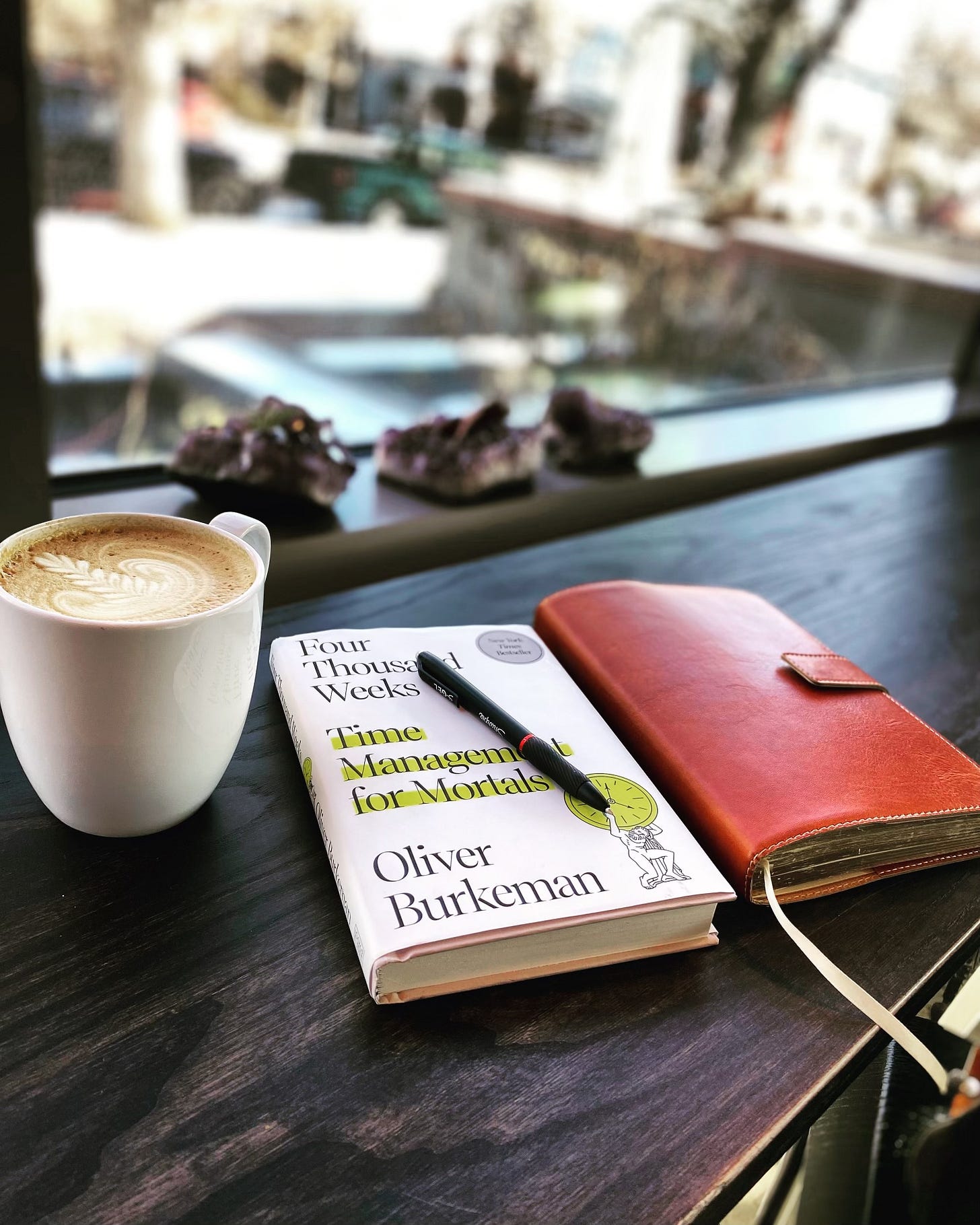Capturing The Shortness of Life
“The average human lifespan is absurdly, insultingly brief. Assuming you live to be eighty, you have just over four thousand weeks.” — Oliver Burkeman
By Diamond-Michael Scott
In just a few months, I’ll reach the ripe old age of 60. That means that I would have lived 3,128 weeks.
If my math skills serve me right, I’ll have…..
…..872 weeks left to reach 80 or
…..2176 weeks left to reach 102
I’m betting on the latter figure, convinced that my regimen of cold morning showers; glutathione, vitamin C and vitamin D supplementation; coffee with L-theanine and raw cacao; long walks; and conscious breathwork will help me stay the course.
In his bestselling book “Four Thousand Weeks: Time Management For Mortals” author Oliver Burkeman offers this sobering thought about what he calls Finitude noting:
“We must live our lives in clear - eyed acknowledgment of our limitations…We often live as though an infinite amount of time is the default and mortality is an outrageous violation.”
Having completed this book at a blistering pace, I am now recommending it to others. And I must admit that it’s quite striking to watch folks flinch when I mention that four thousand weeks is equivalent to a lifespan of eighty years. For there’s this sudden realization of how insanely short life will be for the vast majority of us.
Admittedly, it was 2019 when I first became fully present with my eventual mortality. It was during a stretch of time that year, I briefly found myself without a home, living in 24-hour coffeehouses in San Diego, sleeplessly subsisting off of caffeine and cookies.
Every moment seemed critical as I was navigating through arguably the most challenging period of my life. There were many times during this tumultuous period where I began questioning, “is this it?” “Is this how my life is going to end?”
One night while at Lestat’s, which at the time was one of San Diego’s few 24-hour locales, a man walked in during the wee hours of the morning with his leg wrapped and a noticeable limp. He made his way to a table close to where I was sitting and immediately started trying to engage me in conversation.
As he began asking me for some money to purchase something from the bakery, I happened to look down and see a pool of blood accumulating on the floor from his right leg. Despite his insistence that all he needed was some money and that his leg would be OK, I was eventually able to convince him that getting some medical attention for his ailing leg was far more important than the $5.00 I was able to give him. Thankfully, he eventually allowed me to call the paramedics to get him the help that he needed.
Today, as I look back on the nature of my existence, I am appreciative of what this and other experiences taught me about what’s truly meaningful in life. As Burkeman shared in his book:
“We live as though our lives are infinite only to realize that they’re not — for many of us awareness of this leads to a different set of choices and decisions.”
Then, he cuts to the chase with this refrain
“In the long run, we’re all dead.”
In many ways, Four Thousand Weeks is just another book about making the best use of time. But what makes it unique is that it’s written with the belief that prevailing time management tropes have failed miserably, and that we need to stop deluding ourselves otherwise. Deeply philosophical, thought-provoking and yet practical, Burkeman’s epic book is the perfect elixir for those of us willing to confront the prospect of our own mortality by making better use of the time we have left on this earth plane.
There are countless books on becoming more productive and efficient, life hacks to optimize our day. The 4-Hour Workweek by Tim Ferriss along with David Allen’s popular book “Getting Things Done" are two that immediately come to mind. And then there’s the most nauseating of them all in my view — Stephen Covey’s 7 Habits of Highly Effective People which was popularized in the 80s when Franklin Planners were all the rage.
Burkeman argues that the strategies and tools presented in these books often end up making our lives worse noting…
“Most productivity experts act as merely enablers of our time troubles, by offering ways to keep on believing it might be possible to get everything done.
He says:
“The world is bursting with wonder, and yet it is the rare productivity guru who seems to have considered the possibility that the ultimate point of all of our frenetic doing might be to experience more of that wonder.”
In his book, Burkeman pokes fun at how busyness has been rebranded as “hustle culture,” where relentless work is not seen as “a burden to be endured but as an exhilarating lifestyle choice”
He even throws a bit of shade on the freelance/digital nomad lifestyle I’ve heartily embraced over the past ten plus years or so noting:
“The point to be clear, isn’t that freelancing or long-term travel — let alone family -friendly workplace policies are intrinsically bad things it’s that they come with an unavoidable flip side: every game in personal temporal freedom entails a corresponding loss in how easy it is to coordinate your time with other people’s. The digital nomad’s lifestyle lacks the shared rhythms required for deep relationships to take root. For the rest of us, likewise, more freedom to choose when and where you work makes it harder to forge connections through your job, as well as less likely you’ll be free to socialize when your friends are.”
Burkeman’s wisdom, though, does resonate with my long held views that one’s email inbox will still be full when one dies. Given our limited power over time, Burkeman exhorts us to let go of insanely ridiculous notions of pursuing a “zero inbox” in favor of far more important quests that bring meaning and fulfillment to our remaining life existence.
For me this speaks to my propensity for just letting things drop, those things that in the grand scheme of things are really not all that important. A friend of mine refers to this as “addition by subtraction.” In other words, we can add more flavorful things to our lives by subtracting those that offer little in the way of meaning and significance.
In the end, Burkeman advocates holding space for the anxiety and discomfort we often feel when we are overwhelmed and not on top of everything. This subtle form of acceptance, he says, allows us to more fully experience the things we want to have time for by choosing in each moment what counts the most.
“If you try to find time for your most valued activities by first dealing with all the other important demands on your time, in the hope that there’ll be some left over at the end, you’ll be disappointed.”
A Message From Diamond-Michael Scott:
“Great Books, Great Minds” is my full-time work and life passion, a labor of love fueled by the endless hours of work I put into researching and writing these feature pieces. So if you enjoy this digital newsletter, find it valuable, and savor world-class book experiences featuring epic authors and book evangelists, then please consider becoming a paid supporting member at $6.00 a month or $60.00/year.







I've recently turned 65 and have long held to the belief that 85 years old is a good age to check out. That gives me 20 years--1300 weeks. I say that knowing that both my mother-in-law and my mother lived to 95 and 96 respectively. But one was bent over like Quasimodo, and the other suffered through dementia. It seems, to me, that once you reach the grand old age of 85, things start to go South. Of course, anything after that would be bonus--as long as you have your health--and anything before that would be tragic. But it's wise to accept that you will, one day, expire.